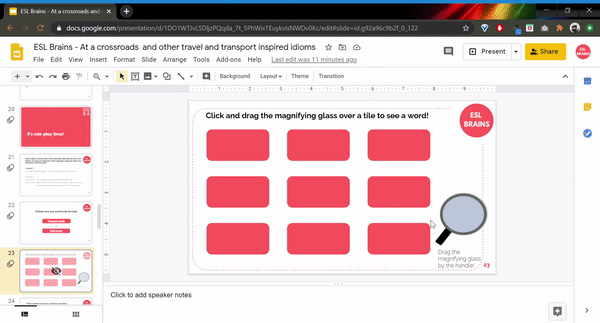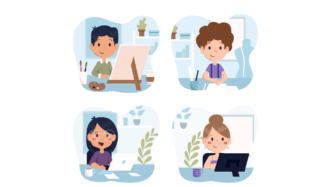LESSON OVERVIEW
This lesson plan deals with travel and transport idioms. Students get a lot of exercises to discover their meanings and practise them in writing as well as speaking. The worksheet can supplement our lesson plans on travelling which you can find here and here.
FROM THE LITERAL TO FIGURATIVE MEANING
First, students have to complete one exercise on vocabulary related to roads and travelling, however, they focus on the literal meanings of given words and phrases. Then, they have to analyse a picture and try to guess what the idiomatic meaning of the given phrase is. Then, they need to also think of an example of being at a crossroads. Next, students move to idiomatic expressions, read the sentences and decide whether they are true or false. If false, students have to explain what the underlined expressions actually mean. Moreover, students work in pairs and discuss some situations which include the idioms with their partners.
IDIOMS WITH DIFFERENT MEANS OF TRANSPORT
Students start with completing given idioms with different means of transport such as train, boat, car, etc. Of course, they also have meanings of these idioms. The list of idioms in that task includes, e.g. be in the same boat, a sinking ship, be on the gravy train, etc. To put them in practice, students finish some dialogues using the idioms and their own ideas.
ROLE PLAY
The last part of this travel and transport idioms worksheet will help students to practise and remember all idioms from the worksheet. Students work in pairs and choose a card from a stack of cards. Each card has one word on it. They have to improvise a short dialogue using any idiom they remember with that word. The optional version of this task could be a Pictionary style game where students have to try and draw the idiomatic expression and the other classmates guess the idiom (thanks Audrey for the suggestion!).
QUICK NOTE ABOUT THE E-LESSON PLAN
In the e-lesson plan, there are 2 ways of doing the last task – i.e. role play. One is designed for the Present mode and the other for the Edit mode. In the Present mode version, you will click the numbers (your students tell you) to see the word they need to use in their improvised conversations. If you choose to go with the Edit mode version, you can let your students control the screen and use the magnifying glass to reveal hidden words. See how it works below:

WORKSHEETS
Subscribe to unlock these and many other Standalone lesson with the Premium plan
Subscribe













to set/ to put something in “train”. Is that correct? Isn’t it “motion”? on slide 12
Nope, not an error. It’s a thing 🙂 See:
https://www.macmillandictionary.com/dictionary/british/set-something-in-train
https://dictionary.cambridge.org/dictionary/english/put-set-sth-in-train
https://www.ldoceonline.com/dictionary/set-something-in-train
How do I get the magnifying glass?
It’s in the slides in the e-lesson plan (slide 23)
I think there is a slight mistake in slide 10.
Tell your partner:
“when was the last time you were at a crossroads”
Should it not read “when the last time you were at a crossroads was” ??? Not sure but if they are are all indirect questions, shouldn’t the first one be too?
Deborah, thank you for your comment! I think you’re right. That should have been an indirect question, but it sounded a bit odd, so we’ve simplified it a bit and changed it to “tell your partner about the last time you were at a crossroads”.
It should read “The last time you were at a crossroads was when”?
No, forget that! Just checked again.
Awesome class. The explanation on how to use the magnifying glass was extremely valuable.
Thanks! Good to hear it helps 🙂
Can you offer more American English lesson plans?
Hi Cris! By default, we follow the British English spelling rules but we often provide vocabulary in both AmE and BrE versions. As you can see, we also often use AmE videos (there’s simply wider choice there) but we rarely do any lessons super-focused on American English. Would you like to see more lessons like that?